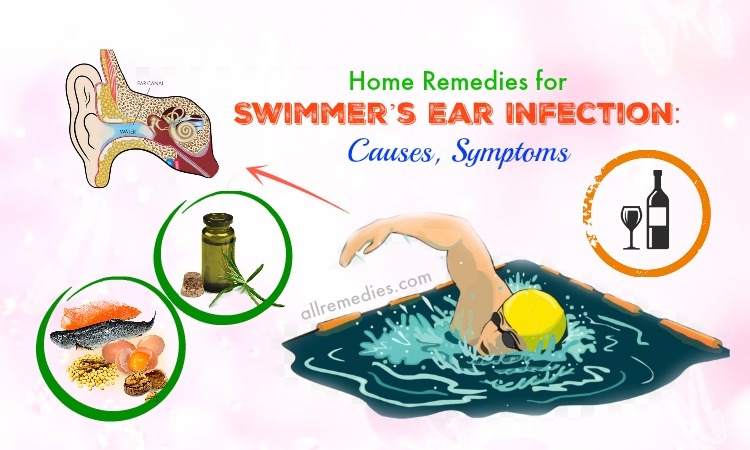
Top 12 Home Remedies for Swimmer’s Ear Infection: Causes, Symptoms
CONTENTS
Overview
Swimmer’s ear [1] is the inflammation of the canal joining the eardrum to the external ear. Moisture – water and different kinds of bacteria – get trapped in the ear canal when a person comes into close contact with water through the act of swimming or bathing. The ear canal gets red and sore and swells up from the irritation.
Read more: 19 Tips on How to Get Water Out of Your Ear Fast and Easily
Who Is At Risk?
Swimmer’s ear is not necessarily found in swimmers. By contrast, the problem is more often in people who are not swimmers. People regardless of their age and gender can be the victim of swimmer’s ear if they often get exposed to the weather changes. Even farmers can also suffer from the situation when they often come into contact with such factors as wind or rain for so long.
Roughly between 3 and 5 percent of the overall population have to handle the throbbing and painful ache as well as difficulties in hearing related to swimmer’s ear infections on a regular basis, and approximately 2 million people annually have the same problems. Despite the fact that children are more often in becoming the victims of ear infection from their habit of swimming in open atmosphere such as in oceans or lakes, adults can be vulnerable to this problem as well. Pain is the very first sign of otitis externa, which is the scientific name for swimmer’s ear. Pain is usually sensed while a person chews food or tugs on their earlobes.
Once a serious infection develops, it can be very painful and hard to be treated without the use of antibiotics. Most drug stores have over-the-counter ear drops that can help dry up moisture inside the ears in people who are susceptible to reoccurring ear infections. However, protecting the ear canal with plugs or a homemade wax substitute while boosting overall immune health with a healthy diet also help lower you or your child’s risk for swimmer’s ear.
When it comes to swimmer’s ear infection in adults, prevention is key. The ultimate way to tackle with swimmer’s ear is to stop it before it even starts. In case of a severe infection, it can hurt terribly, and it is extremely hard to be tolerated without antibiotics. Most pharmacies have over the counter drops or topical creams that can assist in drying up the moisture in the ears of people who are victims of reoccurring ear infections. However, the optimal option is to protect the ear with plugs or different natural home remedies for swimmer’s ear infections while improving the general immune ear health with a balanced diet to help lower the possibilities of contracting swimmer’s ear in adults.
Get more: 21 Natural Home Remedies for Earaches in Adults
AllRemedies Partner Solutions

Keep Asking Questions Until You Get The Answer You Need!
The Medical Experts are all here to answer your questions online or with a phone call.
The Root Causes Of Swimmer’s Ear In Adults
People with improper immune system and issues with the structure of their ears often experience otitis externa [2].
People with such ear conditions as dermatitis or psoriasis can develop ear infections easily due to causing dryness & cracking of the skin, which allows bacteria to survive and multiply.
Other injury or trauma to the ears can also be contributory factors to the infections. Swimmer’s ear is more likely to happen if the skin in the ear canal is already inflamed, chafed, and cracked.
Ear infections can be hereditary. In other words, ear infections tend to run in families, accordingly, those coming from a family in which parents have ear problems tend to have greater risks of getting the infections of ears.
Dirty bodies of water or low quality public pools can be another reason for this ear infection because swimming in them can transfer the bad bacteria into the ear. Germs in pools [3] and at other recreational water venues are among the most common causes of swimmer’s ear in children as well as adults.
Excessive cleaning of earwax can exacerbate the problem, as well as cause injury to the inside of the ear canal and remove too much protective wax.
Find also: Top 20 Natural Home Remedies for Psoriasis That Work
Common Symptoms Of Swimmer’s Ear In Adults
Symptoms of swimmer’s ear can include: itchiness in the ear; difficulties in hearing as compared to normal; draining from the area which gets the infection: redness, tenderness, ear pain, and pressure around the affected ear; difficulties sleeping on the side of the problematic ear for sometimes coupled with throbbing headaches.
With serious infections, it’s possible to feel swelling in the neck as well as other parts of the body, plus to have difficulties in moving the jaw.
Swimmer’s ear usually begins as an itchy ear and then turns slowly into a more serious infection that causes swelling. If the only symptom you currently feel is itchiness, the good news is that an infection likely has not developed and there’s still time to prevent one from forming.
Learn more: 34 Natural Home Remedies for Ear Infection in Adults & Children
Top 12 Natural Home Remedies For Swimmer’s Ear Infections In Adults
1. Soothe Pain With Heat

In case of a swimmer’s ear infection, you had better choose to apply a warm compress onto the painful ear to relieve the severity of the pain. You can depend on the assistance of a dryer or microwave as well to heat up in a towel or use a warm water bottle to simply press against the ear for a period of time until you feel more comfortable. By this way, the heat can reduce the inflammation, giving way for your ears to become normal again.
Check more: 10 Ways How To Clean Your Ears Naturally & Effectively At Home
2. Home Remedies For Swimmer’s Ear Infections – Apply Helpful Essential Oils Or Drops
There are a variety of natural drops and oils that can be utilized inside the ears to prevent infections and moisture from building up. These include some essential oils such as mineral oil and lavender oil owing to the fact that these oils possess antibacterial and anti-inflammatory contents. Therefore, they prove to be effective in treating the symptoms caused by swimmer’s ear infection in adults.
When you are suffering from swimmer’s ear, you had better apply the drops or oils of your preference simply by l pulling your ear gently before directly putting just one to two drops into the ear canal. You might want to shook your head a little bit to help the drops to go deeper in the ears then wait for a few minutes before getting up and doing the exact same thing to the opposite ear.
See more: 29 Benefits of Lavender Oil for Hair, Skin, and Health
3. Rubbing Alcohol And Vinegar Onto Your Affected Ear
One of the most effective home remedies for swimmer’s ear infection is the mixture of alcohol and vinegar. In other words, a cure can be mixed from a solution of rubbing half alcohol and half vinegar. The alcohol combines with water in the ear and then evaporates, removing the water, while the acidity of the vinegar keeps the bacteria from growing. Apply a couple of drops of solution in each ear.
Another easy to follow home remedy is putting 2-3 drops of full strength white vinegar into the ear every two hours. This will be effective against any bacterial or fungal infection.
Read also: 50 Benefits of Apple Cider Vinegar For Health And Beauty
4. Home Remedies For Swimmer’s Ear Infections – Opt For A Wax Substitute
It is a fact that when you experience swimmer’s ear infection, you lose the necessary natural wax in your ear. You can essentially recreate the natural wax that is produced in your ears using a wax substitute, such as petroleum jelly. All you have to do is to swab a cotton ball with some petroleum, then gently rub some of it inside your ear. This definitely assists in absorbing the moisture and drying the inside of the ear.
Find also: 26 Tips How to Use Clove Oil for Toothache, Bad Breath
5. Avoid Removing Earwax

Earwax genuinely serves such important functions as protecting you from bad bacteria, providing a barrier to the inside of the ears, and preventing accumulated moisture. When you develop a swimmer’s ear infection, you should make an effort to avoid using cotton swabs inside the ears to remove wax, especially if you are susceptible to infection. If you feel you produce more earwax than normal and you cannot bear it, you had better talk to a doctor about safely removing excess wax when needed with special equipment.
Get more: 19 Easy and Natural Home Remedies for Tinnitus Problems
6. Home Remedies For Swimmer’s Ear Infections – Stay Out Of The Water Temporarily
So as not to further worsen the infection caused by swimmer’s ear, it is advisory that you keep yourself away from the water until the situation gets better. Avoid getting in the water until after the infection clears up is vitally important, and if the inner ear does get wet try to use a hair dryer to carefully dry the ear as soon as you move out of the water.
Learn also: 24 Natural at Home Remedies for Runny Nose in Adults & Children
7. Keep Away From Packaged, Processed Foods And Sugary Treats
Packaged and processed foods such as hotdogs, bacon, popcorn, etc. may contain added chemicals with high levels of sodium, dyes, as well as other synthetic ingredients that both adults and young children can be allergic to. Try to avoid most things in packaged forms and focus on eating more whole real foods. Furthermore, sugar should also be included in the list of foods to avoid when it comes to home remedies for swimmer’s ear infections. This is understandable as sugar is highly inflammatory, thus it can reduces immune functioning and cause further damage to the ears.
Check also: List Of 10 Foods High In Sodium To Avoid Consuming
8. Avoid Potential Food Allergens, Especially Conventional Dairy Products
Some common allergens include conventional dairy, gluten, shrimp, and peanuts, which can raise inflammation. It is essentially important that you know which foods or food groups you can develop allergies and keep them at bay in case you have swimmer’s ear as they can possibly worsen your infection.
Dairy is a big food group to avoid as lactose intolerance [4] is a quite common problem experienced by people. Consuming excessive amount of dairy products such as cow’s milk, ice cream, cheese, etc. can be harmful to your ears when you already have an ear infection. Pasteurized cows’ dairy products can be mucus-producing and worsen infections in the ears, throat or nasal passageways.
See also: 20 Natural Home Remedies for Allergies in Adults & Children
Top 24 Home Remedies For Lactose Intolerance In Babies
9. Home Remedies For Swimmer’s Ear Infections – Consume Foods Which Are High In Antioxidants

Do not worry when you have to avoid some of the above foods as the list of the foods which you can consume is still very long. High-antioxidant foods prove to be extremely helpful in treating health problems related to inflammation. Veggies and fruits of all kinds, especially those high in antioxidants like vitamin C, keep the immune system strong. This helps speed up healing time and fight off the future bacterial infections.
Moreover, garlic, ginger, turmeric, and other spices, as well as herbs can do the exact same thing. These herbs and spices have natural antimicrobial, anti-inflammatory, and antibacterial properties, which make them ideal natural home remedies for swimmer’s ear infections for adults.
Read more: 35 Proven Amazing Benefits of Garlic for Skin, Hair, and Health
40 Health Benefits of Turmeric Spice and Powder
10. Home Remedies For Swimmer’s Ear Infections – Consume Omega 3-Rich Foods
It is not much of an exaggeration that omega 3 is the key component which you must consume in order to reduce inflammation in your body. You do not have to waste a big sum of money on buying supplements of omega 3 as it is possible to get the amount you need from your daily food choices. Wild caught fish like salmon or tuna and other clean proteins and fats such as nuts and seeds of many kinds help to reduce the inflammation that makes infections more painful. Other sources of clean, lean protein that assists your body with immune function include cage-free eggs, grass-fed beef and pasture-raised poultry.
Get more: The Best List of 30 Healthy Foods High in Protein to Choose
11. Increase The Intake Of Zinc Dense Foods
Zinc is capable of boosting your immune function and promotes healing. Accordingly, it is important that you consume foods which have high zinc content as they can ace the process of healing your swimmer’s ear infection [5]. Some foods which are very high in zinc are oysters, which contain more zinc per serving than any other food, but red meat and poultry provide the majority of zinc in a standard diet. Other good food sources include beans, nuts, types of seafood (crab and lobster), whole grains, fortified breakfast cereals, organic dairy products.
Find also: List of 19 Common Super Foods High in Magnesium To Consume
12. Home Remedies For Swimmer’s Ear – Consume Foods Which Are Natural Probiotics
It is a widely held view that probiotics help to improve gut health and overall immunity of the body. Gut health is of great importance when it comes to any health issues, therefore, improving the conditions of your gut can assist in treating infections caused by swimmer’s ear. You do not need to buy probiotics in forms of supplements because some food groups can provide you with enough probiotics for your gut. They include yogurt, which is one of the best sources of probiotics, and kefir as it contains friendly bacteria that can improve your health. Other options are sauerkraut, tempeh, kimchi, miso, kombucha, and pickles.
Read more: Top 13 Health & Beauty Benefits Of Kombucha Tea, Juice, And Drink
Conclusion
In a nutshell, swimmer’s ear can be an extremely uncomfortable infection for adults to handle. However, with proper care and treatments at home including some natural tips, tricks, home remedies, and diet changes, the infection will dwindle. By following the tips we have provided above, you have the right to hope that the symptoms of your swimmer’s ear will go away soon. If you have any further home remedies for swimmer’s ear infections, please to not hesitate to share with us!

GET FREE ACCESS!
Lorem Ipsum has been the industry's standard dummy text ever since the 1500s, when an unknown printer took a galley of type and scrambled it to make a type specimen book. It has survived not only five centuries
Also on
- 5 Tips How to Use Raw Apple Cider Vinegar for Diarrhea & Vomiting
- 10 Ways How To Use Oregano Oil For Yeast Infection On Skin & In Dogs
- Top 13 Amazing Uses & DIY Recipes of Vitamin E Oil for Face Skin
- For Women: Top 13 Best Herbs For Hormone Balance
- 15 Tips on How to Stop Dizziness Fast from Flu and Allergies
JOIN THE CONVERSATION










